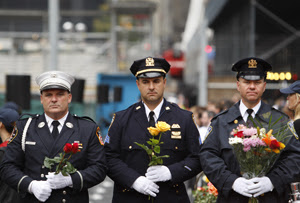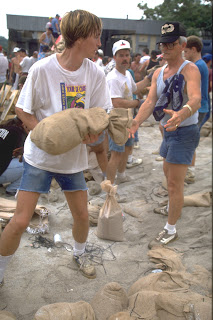by Lou Angeli
New York, NY (September 11, 2007) -- Today I joined thousands of Ground Zero responders in Lower Manhattan to commemorate the 6th anniversary of the attack on the World Trade Center. Of that group, two hundred of us were were invited ny the Mayor's Office to read the names of those who perished 6 years ago, the first time that emergency personnel were offered such a privilege. Needless to say, the event was bittersweet.
For those of you who served at Ground Zero, you’ll recall that we were isolated from the rest of the World in our emergency village. There were no TV's, no newspapers at the disaster site, so we never saw the faces of the missing nor heard the pleas from their friends and families.
But today, 9/11 responders finally came face-to-face with the hundreds of families who lost loved ones during the collapse of the twin towers. When it was my turn to walk onto the stage to stand behind the podium, my reading partner and I were overwhellmed by the thousands standing before us holding out photos of their loved ones and waving so many signs of thanks.
Following the collapses, there were 20 rescues by official count -- perhaps one hundred others that were never recorded. Such rescues, especially those of Port Authority Police Sgt John McLoughlin and his partner Officer Will Jimeno, did a great deal to bolster the spirits of the thousand working at Ground Zero. Unfortunately, only one other rescue was made and within 48 hours rescue turned to recovery.
In the years since 9/11/01, some rescuers still feel that they had failed at their mission. One of them, Jeff Johns, a Transit Authority foreman and Ground Zero rescuer, ended his reading by apologizing to the families saying that, “We wish we could have done more. We tried” Failure is something firefighters, paramedics and law enforcement officers don't take to very well. Neither does Jeff Johns.
70,000 emergency and volunteer responders answered New York City's call for help during the ten day period following the disaster. They came from every state as well as Canada, Mexico, the UK, Germany, Italy, Israel and France. It was a nation coming together -- the world coming together in the spirit of volunteerism.
Some say that we've lost that spirit, but Americans proved again during Hurricanes Katrina and Rita, that they were up to the challenge. As Americans, it is one of those things we do best -- Helping our neighbors in time of need.
 Feds Attempt to Break That Spirit
Feds Attempt to Break That Spirit
But FEMA says – NEVER again!
 According to an AP report, The Federal Emergency Management Agency came up with the idea after the World Trade Center attack and Hurricane Katrina in 2005, when countless Americans rushed to help — unasked, undirected, and sometimes unwanted.
According to an AP report, The Federal Emergency Management Agency came up with the idea after the World Trade Center attack and Hurricane Katrina in 2005, when countless Americans rushed to help — unasked, undirected, and sometimes unwanted.
You need to be a member of My Firefighter Nation to add comments!
Join My Firefighter Nation